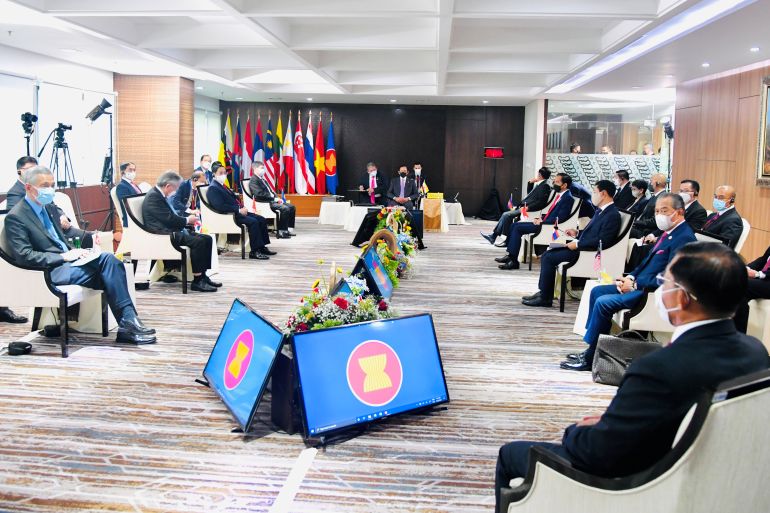ASEAN demands ‘immediate cessation of violence’ in Myanmar
The Association of Southeast Asian Nations issues a five-point statement calling for a constructive dialogue to resolve the Myanmar coup crisis.

The Association of Southeast Asian Nations (ASEAN) has released a five-point statement on the crisis in Myanmar, demanding the “immediate cessation of violence” and calling on all parties in the country to exercise “utmost restraint”.
Myanmar – part of the 10-nation ASEAN – has been in turmoil since the military overthrew civilian leader Aung San Suu Kyi in a coup on February 1, triggering a mass uprising from all corners of society demanding a return to democracy.
Keep reading
list of 3 itemsMilitary coup clouds control over jade, gems in Myanmar
‘Nearly 250,000 people displaced’ in Myanmar military crackdown
The ASEAN document, issued on Saturday following an ASEAN emergency summit in Jakarta, also called for “constructive dialogue” to resolve the crisis.
“[All] parties concerned shall commence to seek a peaceful solution in the interests of the people,” ASEAN said.
It added that “a special envoy of the ASEAN Chair shall facilitate mediation of the dialogue process, with the assistance of the Secretary-General of ASEAN”.
ASEAN also said it would provide humanitarian assistance, and said that the special envoy and delegation would visit Myanmar to meet with all parties concerned.
Here is the ASEAN ‘Five Points of Consensus’. We will have to wait to see whether the Tatmadaw implements any of these broad commitments, and how ASEAN responds to any Tatmadaw delays or failures to meet them. pic.twitter.com/sjzTQmniOz
— Aaron Connelly (@ConnellyAL) April 24, 2021
Earlier on Saturday, Indonesian President Joko Widodo said after crisis talks with military and coup leader Min Aung Hlaing and Southeast Asian leaders that Myanmar’s military must restore democracy and stop committing violence against citizens.
The meeting marked the senior Myanmar general’s first foreign trip since security forces staged a coup in early February.
Min Aung Hlaing has become the focus of international outrage over the coup and a subsequent crackdown on dissent that has left more than 700 dead.
“The first requested commitment is for the Myanmar military to stop the use of violence and that all parties there at the same time must refrain so that tensions can be reduced,” Widodo said.
“The violence must be stopped and democracy, stability and peace in Myanmar must be restored.”
He also called for the release of political prisoners and for a special envoy to be allowed into the country to “push for dialogue”.
“Whatever the decision made by the leaders of the #ASEAN, they should take into account saving lives of innocent civilians." –>#Myanmar's ambassador to the #UN, Kyaw Moe Tun, spoke to @AJEnglish's @baysontheroad ahead of Saturday's summit in Jakarta:#WhatsHappeningInMyanmar pic.twitter.com/jI34opXAvl
— Amanda Price (@amandaruthprice) April 24, 2021
Singapore’s Prime Minister Lee Hsien Loong, meanwhile, called on the military to release Myanmar’s overthrown President Win Myint, as well as democracy icon Aung San Suu Kyi who is under house arrest.
Myanmar’s parallel National Unity Government (NUG) said on Saturday it welcomed “encouraging” news of a consensus among ASEAN leaders on dealing with the crisis.
The newly formed NUG “looked forward to firm action by ASEAN to follow up on its decisions and to restore our democracy and freedom for our people,” Dr Sasa, its spokesman and minister of international cooperation said in a statement.
The NUG, which is comprised of pro-democracy figures, remnants of Aung San Suu Kyi’s administration and representatives of armed ethnic groups, says it is the legitimate authority in Myanmar and was not invited to Saturday’s ASEAN meeting
The gathering of the leaders in Jakarta is the first coordinated international effort to ease the crisis in Myanmar, an impoverished country that neighbours China, India and Thailand.
Following the coup, ASEAN issued a statement that did not explicitly condemn the power grab but urged “the pursuance of dialogue, reconciliation and the return to normalcy in accordance with the will and interests of the people of Myanmar”.
Amid Western pressure, however, the regional group has struggled to take a more forceful position on issues but has kept to its non-confrontational approach.
All ASEAN states agreed to meet Min Aung Hlaing but would not address him as Myanmar’s head of state in the summit, according to Indonesia’s Foreign Minister Retno Marsudi.
Ongoing protests
Approximately two dozen protesters gathered in Jakarta against the coup leader, beating pots and pans and holding signs saying “Democracy for Myanmar” and “We stand against the military coup”.
Several protests were also held in Myanmar’s main cities. In commercial hub Yangon, some residents staged a mock funeral for the senior general by smashing saffron-coloured clay pots on the ground, symbolic of cutting ties with the dead.
The general’s involvement in the Jakarta talks has angered activists, human rights groups and the NUG.
“Meetings that contribute to a solution to the deepening crisis in Myanmar are welcome,” the shadow government said in a statement.
“(But) meetings that exclude the people of Myanmar but include murderer-in-chief Min Aung Hlaing … are unlikely to be helpful.”
The NUG called on the military government to “stop murdering civilians”, release more than 3,000 political prisoners and return power to the country’s democratically elected government.
The London-based rights watchdog Amnesty International urged Indonesia and other ASEAN states ahead of the summit to investigate Min Aung Hlaing over “credible allegations of responsibility for crimes against humanity in Myanmar”.
“The crisis initiated by a murderous and unrepentant Myanmar military has engulfed the country, and will cause severe aftershocks – humanitarian and more – for the entire region,” Amnesty said.
There have also been calls for the regional bloc to expel Myanmar after the coup.
But ASEAN generally takes a hands-off approach to members’ internal affairs.